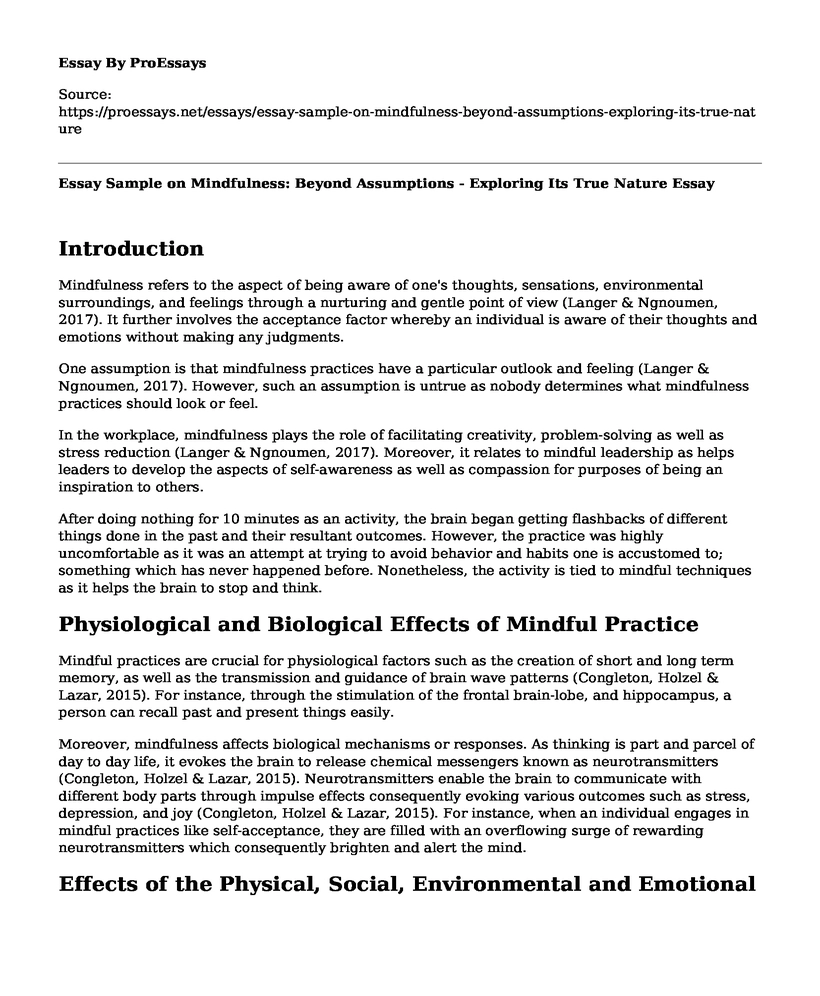Introduction
Mindfulness refers to the aspect of being aware of one's thoughts, sensations, environmental surroundings, and feelings through a nurturing and gentle point of view (Langer & Ngnoumen, 2017). It further involves the acceptance factor whereby an individual is aware of their thoughts and emotions without making any judgments.
One assumption is that mindfulness practices have a particular outlook and feeling (Langer & Ngnoumen, 2017). However, such an assumption is untrue as nobody determines what mindfulness practices should look or feel.
In the workplace, mindfulness plays the role of facilitating creativity, problem-solving as well as stress reduction (Langer & Ngnoumen, 2017). Moreover, it relates to mindful leadership as helps leaders to develop the aspects of self-awareness as well as compassion for purposes of being an inspiration to others.
After doing nothing for 10 minutes as an activity, the brain began getting flashbacks of different things done in the past and their resultant outcomes. However, the practice was highly uncomfortable as it was an attempt at trying to avoid behavior and habits one is accustomed to; something which has never happened before. Nonetheless, the activity is tied to mindful techniques as it helps the brain to stop and think.
Physiological and Biological Effects of Mindful Practice
Mindful practices are crucial for physiological factors such as the creation of short and long term memory, as well as the transmission and guidance of brain wave patterns (Congleton, Holzel & Lazar, 2015). For instance, through the stimulation of the frontal brain-lobe, and hippocampus, a person can recall past and present things easily.
Moreover, mindfulness affects biological mechanisms or responses. As thinking is part and parcel of day to day life, it evokes the brain to release chemical messengers known as neurotransmitters (Congleton, Holzel & Lazar, 2015). Neurotransmitters enable the brain to communicate with different body parts through impulse effects consequently evoking various outcomes such as stress, depression, and joy (Congleton, Holzel & Lazar, 2015). For instance, when an individual engages in mindful practices like self-acceptance, they are filled with an overflowing surge of rewarding neurotransmitters which consequently brighten and alert the mind.
Effects of the Physical, Social, Environmental and Emotional Conditions on Mindful Behavior
While working part-time as a local school, a teaching assistant was assigned to help the principal with his classwork as he had to spend much time dealing with disciplinary cases. After three months of helping out, various students in that particular class emerged as the best improved in the entire school thanks to the tutors caring and friendly approach to teaching. Nonetheless, the principal dismissed the improvement in performance as a consequence of improved learning conditions at the institution. As a result, the teaching assistant was stressed as the principal never bothered to recognize their input in students posting good results.
In this case, the mindful behaviors of self-control and situational acceptance would be essential. Self-control would help avoid a confrontation with the principal, while acceptance would prevent harboring any ill thoughts and feelings towards the principal (Langer & Ngnoumen, 2017). Moreover, emotional intelligence would also be vital as it would enable the individual to approach the principal and talk things out like civilized people in a bid to express themselves (Langer & Ngnoumen, 2017).
Strategies to Identify Psychological and Social Patterns of Behavior
As conflicts are inevitable, the strategy of confrontation would be crucial in the diffusion and reduction of conflicts. The strategy is advantageous as it prevents anger and resentment from accumulating. However, it is disadvantageous as others might mistake it as a sign for war or a fight. Nonetheless, this particular strategy would be useful for the scenario described above as it would help avoid the development of a negative attitude towards the principal, thus opening a channel for future interactions.
Mindful and Compassionate Techniques in Professional and Societal Contexts
The challenges of practicing mindfulness in professional settings are the strenuous efforts that would be required to achieve specific the desired results and the consequent temptations of giving up. However, the challenges can be overcome by sheer determination and focus on reaching a particular destination through mindfulness. Such recommendations would be highly effective as they would help one remember and understand why they are engaging in mindful practices.
References
Congleton, C., Holzel, B. K., & Lazar, S. W. (2015). Mindfulness can literally change your brain. Harvard Business Review, 45(4). Retrieved from https://mindleader.org/wp-content/uploads/2017/08/HARVARD-BUSINESS-REVIEW_MIndfulness-can-change-your-brain.pdf
Langer, E. J., & Ngnoumen, C. T. (2017). Mindfulness. In Positive Psychology (pp. 95-111). Routledge.
Cite this page
Essay Sample on Mindfulness: Beyond Assumptions - Exploring Its True Nature. (2023, Feb 06). Retrieved from https://proessays.net/essays/essay-sample-on-mindfulness-beyond-assumptions-exploring-its-true-nature
If you are the original author of this essay and no longer wish to have it published on the ProEssays website, please click below to request its removal:
- Long Term Romantic Relationship - Essay Sample
- Anatomy and Physiology in Stress Conditions
- Essay Sample on Adequate Sample Size: Key to a Strong Research
- Essay Example on Living in Madness: The Working World in Today's Society
- Essay Example on Emotional Intelligence: Awareness, Self-Regulation & Social Skills
- Personality Tests: Measuring an Individual's Character & Nature - Essay Sample
- Paper Example on Heart Rate Variability & PTSD: A Clinical Review







